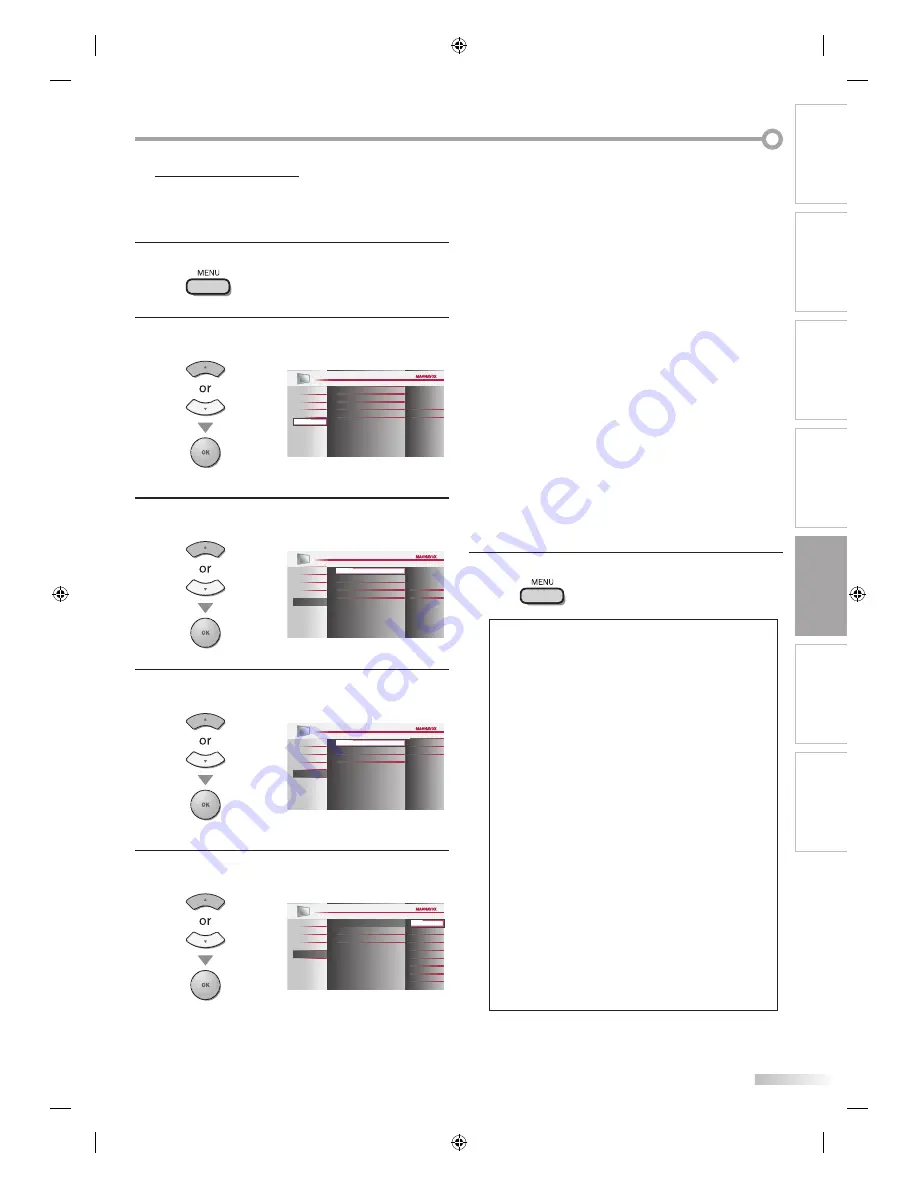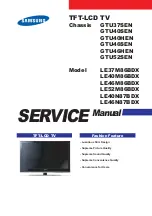
25
EN
WATCHING TV
INTRODUCTION
PREPARATION
INITIAL SETTING
OPTIONAL SETTING
TROUBLESHOOTING
INFORMATION
Closed Caption
You can view closed captioning (cc) for TV programs, movies and news.
Closed caption refer to text of dialogue or descriptions displayed on-screen
for the hearing impaired.
1
Press
[MENU]
to display the main menu.
2
Use
[Cursor
K
/
L
]
to select “FEATURES”, then press
[OK]
.
PICTURE
SOUND
SETUP
FEATURES
LANGUAGE
EXIT
Parental Control
PC Settings
HDMI1 Audio Source
Auto Detect
Closed Caption
3
Use
[Cursor
K
/
L
]
to select “Closed Caption”, then
press
[OK]
.
PICTURE
SOUND
SETUP
FEATURES
LANGUAGE
EXIT
Parental Control
PC Settings
HDMI1 Audio Source
Auto Detect
Closed Caption
4
Use
[Cursor
K
/
L
]
to select “Conventional CC”, then
press
[OK]
.
PICTURE
SOUND
SETUP
FEATURES
LANGUAGE
EXIT
DTV CC
CC Style
Off
Off
Conventional CC
5
Use
[Cursor
K
/
L
]
to select the desired closed caption,
then press
[OK]
.
PICTURE
SOUND
SETUP
FEATURES
LANGUAGE
EXIT
DTV CC
CC Style
CC-1
CC-2
CC-3
CC-4
T-1
T-2
T-3
T-4
Off
Conventional CC
5
Caption Mode
CC-1 and T-1;
are the primary caption and text services.
The captioning or text is displayed in the same
language as the program’s dialogue
(up to 4 lines of script on the TV screen, where it
does not obstruct relevant parts of the picture).
CC-3 and T-3;
serve as the preferred data channels.
The captioning or text is often a secondary language.
CC-2, CC-4, T-2 and T-4;
are rarely available and broadcasters use them only in
special conditions, such as when “CC-1” and “CC-3” or
“T-1” and “T-3” are not available.
There are 3 display modes according to programs:
Paint-on mode:
Displays input characters on the TV screen
immediately.
Pop-on mode:
Once characters are stored in memory, they are
displayed all at once.
Roll-up mode:
Displays the characters continuously by scrolling
(max. 4 lines).
6
Press
[MENU]
to exit.
Note:
• To show the closed caption on your TV screen, broadcast
signal must contain the closed caption data.
• Not all TV programs and commercials have the closed
caption or all types of the closed caption.
• Captions and texts may not match the TV voice exactly.
• Changing channels may delay the closed caption for a few
seconds.
• Adjusting or muting the volume may delay the closed
caption for a few seconds.
• Abbreviations, symbols and other grammatical shortcuts
may be used in order to keep pace with the on-screen
action. This is not a problem with the TV.
• The caption or text characters will not be displayed while
the main menu or functions display is shown.
• If a black box appears on the TV screen, this means that
the closed caption is set to the text mode. To clear the box,
select “CC-1”, “CC-2”, “CC-3”, “CC-4” or “Off”.
• If the TV receives poor quality television signals, the
captions may contain errors, or there might be no captions
at all. Some possible causes of poor quality signals are:
- Automobile ignition noise
- Electric motor noise
- Weak signal reception
- Multiplex signal reception (ghosts or screen flutter)
• The TV retains the closed caption setting if the power fails.
• Closed caption will not be displayed when you are using
an HDMI connection.
• When the TV receives a special effects playback signal (i.e.,
Search, Slow and Still) from a VCR’s video output channel
(CH3 or CH4), the TV may not display the correct caption or
text.
•
A8AF2UH_32MF338 B_EN_v2.indd 25
A8AF2UH_32MF338 B_EN_v2.indd 25
2008/02/15 14:52:46
2008/02/15 14:52:46














































